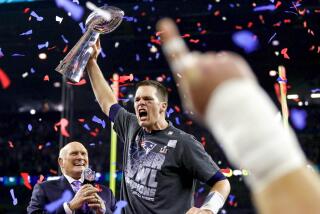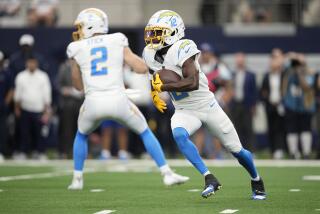SUPER BOWL XXVII : PRO FOOTBALL / BOB OATES : Cowboys’ Haley Sets Example When Play Shows Experience
- Share via
Some big games have to be saved before they can be won. And that is precisely what happened in Super Bowl XXVII Sunday when Dallas Cowboy defensive end Charles Haley made the turning-point plays in the first quarter.
In his most conspicuous effort, Haley moved from his usual station at right end to attack the Bills from left end. Confounding a good Buffalo offensive tackle, Howard Ballard, who apparently hadn’t expected to see him on his side, Haley sacked Buffalo Bill quarterback Jim Kelly into the fumble that was to put the Cowboys in front for keeps, 14-7.
But more than that--much more--Haley steadied the young, nervous Dallas team in the game’s critical opening minutes.
Although the Cowboys were a runaway winner eventually, 52-17, the Bills played the better football for most of the first quarter, when the Texas visitors, very jumpy in their first Super Bowl, tried to give the game away.
It was in the game’s fifth minute that the Cowboys suffered the blocked punt that led to a 7-0 Buffalo lead. They also drew two early penalties for fouling Buffalo unnecessarily. And otherwise, for nearly a quarter, they were still performing much the way you might expect of the league’s youngest team in such a game as this.
Then Haley said, “Watch me.”
He was the only Cowboy on the Rose Bowl field with extensive Super Bowl experience, which he had acquired as a San Francisco 49er. And, playing as alertly as he ever had in San Francisco, he provided the example that the Cowboys followed to victory.
Dallas Coach Jimmy Johnson had traded for Haley last summer just before the season began, when he also traded for safety Thomas Everett, who made two sure-handed interceptions to help smash the Buffalo team.
Everett helped. But without Haley, the Cowboys might not have been in the game soon enough, or long enough, to win.
Turner’s hour: The only question of this Super Bowl was whether the Cowboys could play their game in their first exposure to the stresses of this high-pressure event. They were much the better team. But sometimes the better team, if it lacks such a catalyst as Haley, can’t make good.
The Bills failed to handle Dallas’ defensive star, and they proved that they couldn’t handle the Dallas quarterback, either.
And when the pressure came off his team, Troy Aikman, in the last three quarters, easily made the plays that made it a rout.
The unseen star of the afternoon was Aikman’s offensive coordinator, Norv Turner, who is a master of the science of aggressive pass offense.
That was most obvious when Aikman was throwing touchdown passes. Following Johnson’s general philosophy and Turner’s specific instructions, Aikman threw all four on first-down plays--striking whenever the Buffalo defense was psychologically down, twice after turnovers.
Turner’s game plan was tailored to the kind of football that Aikman plays best:
--He is both solid and quick in the pocket.
--He has mastered the quick-pass motion pioneered by Hall of Famer Joe Namath.
--Tough physically, and also tough-minded, Aikman consistently plays within himself, rarely throwing the deep sideline pass and normally only throwing bombs when a receiver is five yards open.
--He delivers few interceptions, and he has the vision and agility, as well as the quickness, to avoid sacks.
--He almost never misses the short inside pass, the quick shot to receivers running quick slants and short square-in patterns. Against Buffalo, over and over and over again, that was Aikman’s offense.
It is a fail-safe offense that Turner has devised for Johnson’s team, and they have just the right quarterback to run it.
Blunder day: The Bills in the first two or three quarters weren’t as far out of the game as it might have seemed to those who only saw the score after Aikman’s first series of the third quarter, 31-10.
Three first-half mechanical misplays by three Bills’ stars cost them the 21 points that their team could never get back.
The first was Kelly’s goal-line fumble, which was induced by Haley but could have been avoided if Kelly had shown more cool at a moment when the game was tied, 7-7.
Buffalo’s second big errant play was a dropped touchdown pass by wide receiver Don Beebe, thrown by backup quarterback Frank Reich late in the first half. A touchdown there would have tied the score again, 14-14, and, moreover, it would have elevated Reich’s confidence level after two weeks of little practice.
The third Buffalo blunder was running back Thurman Thomas’ fumble at the Bills’ 20-yard line in the last two minutes of the half, setting up Aikman’s second touchdown pass on successive plays for 28-10 at halftime.
It was a second-effort fumble, but at that time and place, why was Thomas making a second effort? He was surrounded by Cowboys. If he had broken a tackle or two, he wasn’t going anywhere.
Reich might have made a game of it in the second half but for Thomas, Beebe and Kelly. But Reich wasn’t going to win it. Not this time. Not against the NFC champion. Not after the Cowboys got their feet on the ground, courtesy of Charles Haley. Seldom has an NFL trade meant more to two clubs than last summer’s Haley trade: At the same time that it knocked the 49ers out, it eased the Cowboys in.
More to Read
Go beyond the scoreboard
Get the latest on L.A.'s teams in the daily Sports Report newsletter.
You may occasionally receive promotional content from the Los Angeles Times.










